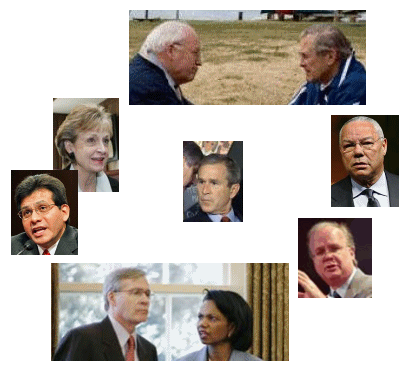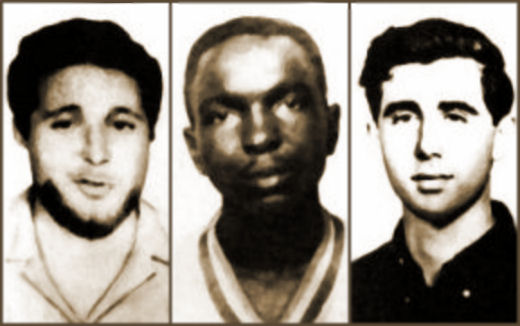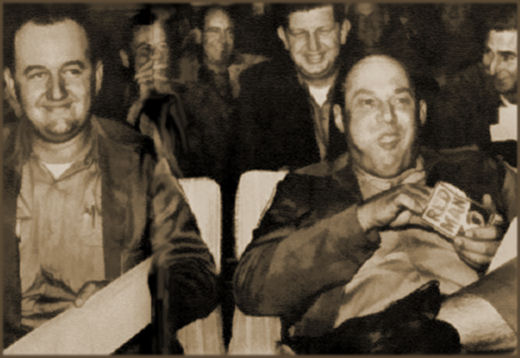There is a set of actual theories that underlie the peculiar and paranoid way that Dick Cheney and his cohorts think – the way he spoke in his recent speech at the American Enterprise Institute. It flowered in the culture of the A.E.I. during the 1990’s where the Neoconservatives spent the Clinton years. Notice the date on this Seymour Hersh New Yorker article, shortly after the Invasion of Iraq but before Joseph Wilson’s op-ed that questioned the pre-war intelligence.
Selective Intelligence Donald Rumsfeld has his own special sources. Are they reliable? New Yorker by Seymour M. Hersh
May 12, 2003
They call themselves, self-mockingly, the Cabal—a small cluster of policy advisers and analysts now based in the Pentagon’s Office of Special Plans. In the past year, according to former and present Bush Administration officials, their operation, which was conceived by Paul Wolfowitz, the Deputy Secretary of Defense, has brought about a crucial change of direction in the American intelligence community. These advisers and analysts, who began their work in the days after September 11, 2001, have produced a skein of intelligence reviews that have helped to shape public opinion and American policy toward Iraq. They relied on data gathered by other intelligence agencies and also on information provided by the Iraqi National Congress, or I.N.C., the exile group headed by Ahmad Chalabi. By last fall, the operation rivalled both the C.I.A. and the Pentagon’s own Defense Intelligence Agency, the D.I.A., as President Bush’s main source of intelligence regarding Iraq’s possible possession of weapons of mass destruction and connection with Al Qaeda. As of last week, no such weapons had been found. And although many people, within the Administration and outside it, profess confidence that something will turn up, the integrity of much of that intelligence is now in question.
The director of the Special Plans operation is Abram Shulsky, a scholarly expert in the works of the political philosopher Leo Strauss. Shulsky has been quietly working on intelligence and foreign policy issues for three decades; he was on the staff of the Senate Intelligence Committee in the early nineteen-eighties and served in the Pentagon under Assistant Secretary of Defense Richard Perle during the Reagan Administration, after which he joined the Rand Corporation. The Office of Special Plans is overseen by Under Secretary of Defense William Luti, a retired Navy captain. Luti was an early advocate of military action against Iraq, and, as the Administration moved toward war and policy-making power shifted toward the civilians in the Pentagon, he took on increasingly important responsibilities.
W. Patrick Lang, the former chief of Middle East intelligence at the D.I.A., said, “The Pentagon has banded together to dominate the government’s foreign policy, and they’ve pulled it off. They’re running Chalabi. The D.I.A. has been intimidated and beaten to a pulp. And there’s no guts at all in the C.I.A.”
 … Shulsky’s work has deep theoretical underpinnings. In his academic and think-tank writings, Shulsky, the son of a newspaperman—his father, Sam, wrote a nationally syndicated business column—has long been a critic of the American intelligence community. During the Cold War, his area of expertise was Soviet disinformation techniques. Like [Paul] Wolfowitz, he was a student of Leo Strauss’s, at the University of Chicago. Both men received their doctorates under Strauss in 1972. Strauss, a refugee from Nazi Germany who arrived in the United States in 1937, was trained in the history of political philosophy, and became one of the foremost conservative émigré scholars. He was widely known for his argument that the works of ancient philosophers contain deliberately concealed esoteric meanings whose truths can be comprehended only by a very few, and would be misunderstood by the masses. The Straussian movement has many adherents in and around the Bush Administration. In addition to Wolfowitz, they include William Kristol, the editor of the Weekly Standard, and Stephen Cambone, the Under-Secretary of Defense for Intelligence, who is particularly close to Rumsfeld. Strauss’s influence on foreign-policy decision-making [he never wrote explicitly about the subject himself] is usually discussed in terms of his tendency to view the world as a place where isolated liberal democracies live in constant danger from hostile elements abroad, and face threats that must be confronted vigorously and with strong leadership.
… Shulsky’s work has deep theoretical underpinnings. In his academic and think-tank writings, Shulsky, the son of a newspaperman—his father, Sam, wrote a nationally syndicated business column—has long been a critic of the American intelligence community. During the Cold War, his area of expertise was Soviet disinformation techniques. Like [Paul] Wolfowitz, he was a student of Leo Strauss’s, at the University of Chicago. Both men received their doctorates under Strauss in 1972. Strauss, a refugee from Nazi Germany who arrived in the United States in 1937, was trained in the history of political philosophy, and became one of the foremost conservative émigré scholars. He was widely known for his argument that the works of ancient philosophers contain deliberately concealed esoteric meanings whose truths can be comprehended only by a very few, and would be misunderstood by the masses. The Straussian movement has many adherents in and around the Bush Administration. In addition to Wolfowitz, they include William Kristol, the editor of the Weekly Standard, and Stephen Cambone, the Under-Secretary of Defense for Intelligence, who is particularly close to Rumsfeld. Strauss’s influence on foreign-policy decision-making [he never wrote explicitly about the subject himself] is usually discussed in terms of his tendency to view the world as a place where isolated liberal democracies live in constant danger from hostile elements abroad, and face threats that must be confronted vigorously and with strong leadership.

Leo Strauss [1899-1973]
How Strauss’s views might be applied to the intelligence-gathering process is less immediately obvious. As it happens, Shulsky himself explored that question in a 1999 essay, written with Gary Schmitt, entitled Leo Strauss and the World of Intelligence [By Which We Do Not Mean Nous] — in Greek philosophy the term nous denotes the highest form of rationality. In the essay, Shulsky and Schmitt write that Strauss’s “gentleness, his ability to concentrate on detail, his consequent success in looking below the surface and reading between the lines, and his seeming unworldliness … may even be said to resemble, however faintly, the George Smiley of John le Carré’s novels.” Echoing one of Strauss’s major themes, Shulsky and Schmitt criticize America’s intelligence community for its failure to appreciate the duplicitous nature of the regimes it deals with, its susceptibility to social-science notions of proof, and its inability to cope with deliberate concealment.
The agency’s analysts, Shulsky and Schmitt argue, “were generally reluctant throughout the Cold War to believe that they could be deceived about any critical question by the Soviet Union or other Communist states. History has shown this view to have been extremely naïve.” They suggested that political philosophy, with its emphasis on the variety of regimes, could provide an “antidote” to the C.I.A.’s failings, and would help in understanding Islamic leaders, “whose intellectual world was so different from our own.”
Strauss’s idea of hidden meaning, Shulsky and Schmitt added, “alerts one to the possibility that political life may be closely linked to deception. Indeed, it suggests that deception is the norm in political life, and the hope, to say nothing of the expectation, of establishing a politics that can dispense with it is the exception”…
-
In a famous book, which laid out an agenda for the development of U.S. intelligence analysis in the post-World War II era, Sherman Kent, Yale history professor and former member of the World War II-era Office of Strategic Services [the OSS, forerunner of the CIA] argued that intelligence analysis should adopt the social science method which was then being elaborated in the academy…
-
Another nontraditional feature of Kent’s program was that it explicitly downplayed the importance of the possibility of deception.…
-
While Strauss never, of course, addressed the question of intelligence analysis, it is easy to guess what he might have said about Kent’s proposed methodology, since it was based squarely on the developments in social science that Strauss attacked. The primary point of attack would have been that it ignored the differences among "regimes" in its search for universal truths of social science. While Strauss was interested in understanding human nature, he understood from his study of the tradition of political philosophy – from Aristotle, most of all – that, in political life, universal human nature is encountered not in its unvarnished state, but as reflected through the prism of the "regime"…
-
Be this as it may, Strauss’s view certainly alerts one to the possibility that political life may be closely linked to deception. Indeed, it suggests that deception is the norm in political life, and the hope, to say nothing of the expectation, of establishing a politics…
Remember, these Straussians are not just random academics off in some Ivory Tower. Gary Schmitt is a fellow at the American Enterprise Institute and was the Executive Director of the Project for the New American Century. Abram Shulsky was the Director of the Office of Special Plans in the Department of Defense providing the "intelligence" behind the Invasion of Iraq. Recall also that the infamous dolt, Douglas Feith, was part of Shulsy’s operation at the DoD from the start.
There is some kernel wisdom in Strauss’s thinking. He’s cynical about utopian governments, as he should be. His idea that deception is rampant in political discourse, particularly the public variety, is probably righter than it is wrong. Schmitt and Shulsky may, themselves, even be partially right that applying the scientific "social science" methodology to intelligence information may lead to missing some things – requiring too much proof. They are certainly making explicit the general attitude rampant in the right wing think tanks of the 1990’s – that the C.I.A., the State Department, and the Clinton White House were naive and missing the essential evil and duplicity of the Middle Eastern "regimes" [particularly Saddam Hussein].
| But the whole lot of them missed the Fatal Flaw in this kind of thought, the Flaw that much of our intelligence community’s way of approaching matters with rigorous analysis was designed to prevent — self deception. |
Rumsfeld and his colleagues believed that the C.I.A. was unable to perceive the reality of the situation in Iraq. “The agency was out to disprove linkage between Iraq and terrorism,” the Pentagon adviser told me. “That’s what drove them. If you’ve ever worked with intelligence data, you can see the ingrained views at C.I.A. that color the way it sees data.” The goal of Special Plans, he said, was “to put the data under the microscope to reveal what the intelligence community can’t see. Shulsky’s carrying the heaviest part”…
If Special Plans was going to search for new intelligence on Iraq, the most obvious source was defectors with firsthand knowledge. The office inevitably turned to Ahmad Chalabi’s Iraqi National Congress. The I.N.C., an umbrella organization for diverse groups opposed to Saddam, is constantly seeking out Iraqi defectors. The Special Plans Office developed a close working relationship with the I.N.C., and this strengthened its position in disputes with the C.I.A. and gave the Pentagon’s pro-war leadership added leverage in its constant disputes with the State Department. Special Plans also became a conduit for intelligence reports from the I.N.C. to officials in the White House…
This Fatal Flaw pervaded everything. They just "knew" that Saddam Hussein was running a "deceptive" "regime" and had to be deposed. They just "knew" that Saddam Hussein was lying about his weapons programs. They just "knew" that he was behind or at least in cahoots with the al Qaeda Terrorists.
The O.S.P. found any number of hints and allegations that connected Hussein and Bin Laden. They jumped on any whiff of a thought that Hussein was developing an ominous weaponry – the lies of the Iraqi National Congress, the duplicity of the Italian Secret Service legitimizing the cheap Niger Yellowcake forgery of Rocco Martino, the Italian Aluminum Tubes [for missles] that they morphed into centrifuge tubes for concentrating uranium, and when their al Qaeda captives wouldn’t confess to the Iraqi connections [deceptive guys that they were], they tortured them until at least one of them said what they wanted to hear to keep from being buried alive in Egypt [Ibn al-Shaykh al-Libi].
Dick Cheney, Donald Rumsfeld, Paul Wolfowitz, Abram Shulsky, Douglas Feith, and a number of other quieter players, felt they were the carriers of a special knowledge – the truth of their own interpretation of Leo Strauss’s view of the political landscape. The naive scientism of the C.I.A., the D.I.A., the Democrats, and the State Department had lead us away from the stark reality of the real world. It was their duty and calling to bring us down to earth, to the "Dark Side" of world politics were the ugly truth languished. We’ll never know how much their idiosyncratic world view directed what happened, or whether it was what many people think – that they are simply paranoid and greedy men who live in a world where power is the only currency. Whatever the combination, lofty theory or twisted personality, the net result was the creation of the very kind of government that Strauss warned us about – a deceptive regime…


 This is the poem we learned in grammar school for Memorial Day. It was written during World War I by a Canadian Physician after the poignant loss of his friend. In my childhood, veterans sold red poppies made of wire and red crepe paper to be worn in the lapel on Memorial Day [Decorations Day]. Then in 1963, on a visit home for the holidays, I was told that a childhood friend, David, had been killed in a war – a place called Viet Nam. At the time, I’d never heard that name. It was before the Gulf of Tonkin incident that heralded our full engagement in Viet Nam.
This is the poem we learned in grammar school for Memorial Day. It was written during World War I by a Canadian Physician after the poignant loss of his friend. In my childhood, veterans sold red poppies made of wire and red crepe paper to be worn in the lapel on Memorial Day [Decorations Day]. Then in 1963, on a visit home for the holidays, I was told that a childhood friend, David, had been killed in a war – a place called Viet Nam. At the time, I’d never heard that name. It was before the Gulf of Tonkin incident that heralded our full engagement in Viet Nam. … Shulsky’s work has deep theoretical underpinnings. In his academic and think-tank writings, Shulsky, the son of a newspaperman—his father, Sam, wrote a nationally syndicated business column—has long been a critic of the American intelligence community. During the Cold War, his area of expertise was Soviet disinformation techniques. Like [Paul] Wolfowitz, he was a student of Leo Strauss’s, at the University of Chicago. Both men received their doctorates under Strauss in 1972. Strauss, a refugee from Nazi Germany who arrived in the United States in 1937, was trained in the history of political philosophy, and became one of the foremost conservative émigré scholars. He was widely known for his argument that the works of ancient philosophers contain deliberately concealed esoteric meanings whose truths can be comprehended only by a very few, and would be misunderstood by the masses. The Straussian movement has many adherents in and around the Bush Administration. In addition to Wolfowitz, they include William Kristol, the editor of the Weekly Standard, and Stephen Cambone, the Under-Secretary of Defense for Intelligence, who is particularly close to Rumsfeld. Strauss’s influence on foreign-policy decision-making [he never wrote explicitly about the subject himself] is usually discussed in terms of his tendency to view the world as a place where isolated liberal democracies live in constant danger from hostile elements abroad, and face threats that must be confronted vigorously and with strong leadership.
… Shulsky’s work has deep theoretical underpinnings. In his academic and think-tank writings, Shulsky, the son of a newspaperman—his father, Sam, wrote a nationally syndicated business column—has long been a critic of the American intelligence community. During the Cold War, his area of expertise was Soviet disinformation techniques. Like [Paul] Wolfowitz, he was a student of Leo Strauss’s, at the University of Chicago. Both men received their doctorates under Strauss in 1972. Strauss, a refugee from Nazi Germany who arrived in the United States in 1937, was trained in the history of political philosophy, and became one of the foremost conservative émigré scholars. He was widely known for his argument that the works of ancient philosophers contain deliberately concealed esoteric meanings whose truths can be comprehended only by a very few, and would be misunderstood by the masses. The Straussian movement has many adherents in and around the Bush Administration. In addition to Wolfowitz, they include William Kristol, the editor of the Weekly Standard, and Stephen Cambone, the Under-Secretary of Defense for Intelligence, who is particularly close to Rumsfeld. Strauss’s influence on foreign-policy decision-making [he never wrote explicitly about the subject himself] is usually discussed in terms of his tendency to view the world as a place where isolated liberal democracies live in constant danger from hostile elements abroad, and face threats that must be confronted vigorously and with strong leadership. 
 In Joseph Conrad’s novella, Heart of Darkness, we enter the story at the end when the central character, Kurtz, is dying. Kurtz was a man of promise and ambition whose descent into the darkness of the Congo was accompanied by a plunge into hatred and madness. We know the story more recently from Marlon Brando’s role in the movie adaptation, Apocolypse Now. I don’t think it’s a reach to make an analogy between Kurtz and Dick Cheney. In his speech, Cheney sanitizes his Enhanced Interrogation Program, but as we read these stories of his direct involvement and the things that were done, it’s clear that the truth is that he personally shepherded this walk on the "dark side" – one that approached that of Conrad’s fictional Kurtz. From his speech:
In Joseph Conrad’s novella, Heart of Darkness, we enter the story at the end when the central character, Kurtz, is dying. Kurtz was a man of promise and ambition whose descent into the darkness of the Congo was accompanied by a plunge into hatred and madness. We know the story more recently from Marlon Brando’s role in the movie adaptation, Apocolypse Now. I don’t think it’s a reach to make an analogy between Kurtz and Dick Cheney. In his speech, Cheney sanitizes his Enhanced Interrogation Program, but as we read these stories of his direct involvement and the things that were done, it’s clear that the truth is that he personally shepherded this walk on the "dark side" – one that approached that of Conrad’s fictional Kurtz. From his speech: Why would a Vice President of the United States personally oversee such a program? Why would he immerse himself in the details of the gathering of intelligence, making personal trips to the C.I.A. to question our analysts? Why would he and his lawyer David Addington personally involve themselves in getting the legal memos to approve torture? Why would he interfere with the C.I.A. Inspector General’s inquiry into the C.I.A.’s activity? How does he know about what really happened at Abu Ghraib? Why does he claim that the Obama Administration is out to get him when we all know that the President would love for us to shut up and "look forward?" Why is he making a pro-torture speech at the American Enterprise Institute after leaving office instead of riding the range in Wyoming? Was this dark trend in his personality there from the start, or did the events of 9/11 drive him there? This week he said:
Why would a Vice President of the United States personally oversee such a program? Why would he immerse himself in the details of the gathering of intelligence, making personal trips to the C.I.A. to question our analysts? Why would he and his lawyer David Addington personally involve themselves in getting the legal memos to approve torture? Why would he interfere with the C.I.A. Inspector General’s inquiry into the C.I.A.’s activity? How does he know about what really happened at Abu Ghraib? Why does he claim that the Obama Administration is out to get him when we all know that the President would love for us to shut up and "look forward?" Why is he making a pro-torture speech at the American Enterprise Institute after leaving office instead of riding the range in Wyoming? Was this dark trend in his personality there from the start, or did the events of 9/11 drive him there? This week he said:

